Friday, 2 November 2012
That Poor Misguided Angel
KNIVES CHAU
17 YEARS OLD
STATUS: TOTALLY CRAZY
“Scott Pilgrim is dating a high schooler!” So begins the tale of Scott Pilgrim, introducing at the same moment its titular character and his seventeen-year-old counterpart, Knives Chau.
Knives enters the story as a stereotypical Asian teenager, complete with overbearing parents and advanced textbooks. She initially treats Scott as another friend, regaling him with stories of high school drama. Their relationship is almost preternaturally innocent, and it is only after she hears Sex Bob-omb play for the first time that her obsession with Scott truly takes hold. Hearing those poorly played chords pitches her face first onto the Yellow Brick Road to adulthood; though her world as we see it remains a land of black and white, she has clearly had her first glimpse of Technicolor.
For Kim, music is a constant, structuring her life; for Knives, it is a gateway to emotions and situations she has never before had a chance to experience. When Scott starts dating Ramona, Knives bemoans her relative lack of life experience: “She’s had time, you know?? She’s got a head start! What am I supposed to do?? How do I fight that? I didn’t even know there was good music until like two months ago!!” Knives frames what she seems to think of as a kind of life seniority in terms of music knowledge, as if everyone had an equally melodic moment of maturation.
Her discovery of music also coincides with the beginning of her search for a model of femininity to emulate. After that first rehearsal, she cuts her hair and starts to dress like Kim. Once Scott has dumped her for Ramona, she gets highlights, mimicking Ramona’s dye job as if that will restore her to Scott’s favour. Although she doesn’t imitate any particular aspect of Envy’s style, she does become obsessed with her, not only explicitly calling her her role model, but also freaking out over the idea that she’s kissed the lips that have kissed Envy. She even tells Scott that he’ll “always be [her] Clash at Demonhead,” compounding in one sentence her love of Scott, her obsession with Envy, and her devotion to music.
This is not to say that Knives’ attitude toward other women is at all positive or healthy. For the majority of the series, she views Ramona as the harlot who stole her man while refusing to see Scott for the cad he demonstrably is. She is constantly using gender-based insults like “slut” and often stoops to calling other women “ugly” or “fat,” regardless of evidence for either claim.
Accordingly, most of Knives’ characterization revolves around her being herself a kind of two-dimensionally awful woman. She is the Crazy Ex-Girlfriend who becomes a stalker and picks fights with her ex’s current love interest, asserting throughout that she’s a “Scottaholic.” She dates Young Neil because he looks like Scott. She even has a shrine. In a narrative that revolves around Scott, she becomes proof of the damage a Scott-centred existence can do.
She is also, in many ways, a reflection of Scott. His dating her represents a regression, as he turns to the easy world of teenage dating to avoid the realities of adulthood. Over the course of the series, he must grow up and learn to take responsibility for his own actions, learning that life isn’t a video game, even if he appears to be living in one. Knives undergoes a more straightforward, if less thoroughly explored, coming-of-age story. She is introduced as a shy, naive child who begins a musically triggered metaphorical puberty. By the third volume, she is beginning to understand the double-edged sword that is adulthood: “I mean, I’m not totally happy, but there’s no way I’d go back to my old oblivious self! I like it here. I like all the... confusion and heart-break. … I feel like I’ve learned some stuff along the way. I know things now.” Eventually, by the final book, Knives’ development has surpassed Scott’s. She is eighteen, an adult in the eyes of the law and a soon-to-be graduate of high school, and she has left the stalled Scott behind. This becomes obvious when she rejects Scott’s offer of casual sex, telling him that they should try to be grown-ups.
Her maturity is finally demonstrated by her decision to let Scott go. He retains the importance of being her first boyfriend as well as the person who helped open her eyes to the world beyond her Catholic school, but that’s all. As she asserts, “I’m happy being alone right now, Scott. I’m trying to learn to like me. Alone.” Best ending for a character that seemed to be nothing more than a caricature of a crazy ex? We think so.
The film’s version of Knives doesn’t fare much better than Ramona or Kim. While she does get to replace Ramona in the final battle against Gideon, she was only there because she wanted to fight Ramona and punish her for stealing Scott. Whereas the comic leaves us with an image of Knives as an independent person striking out on her own, the film ends with Knives telling Scott to go get the girl, assuring him with a wry “I’m too cool for you anyway.” It’s an important and disappointing difference. Comic!Knives completes her character arc by growing up, and leaving Scott behind is merely part of the process. Movie!Knives completes her own arc by letting Scott go, making the romantic relationship the whole point of her story. As you may imagine, we don’t like this ending very much at all.
Verdict: Supporting Role (Comic) and Love Interest (Film)
Subscribe to:
Post Comments (Atom)
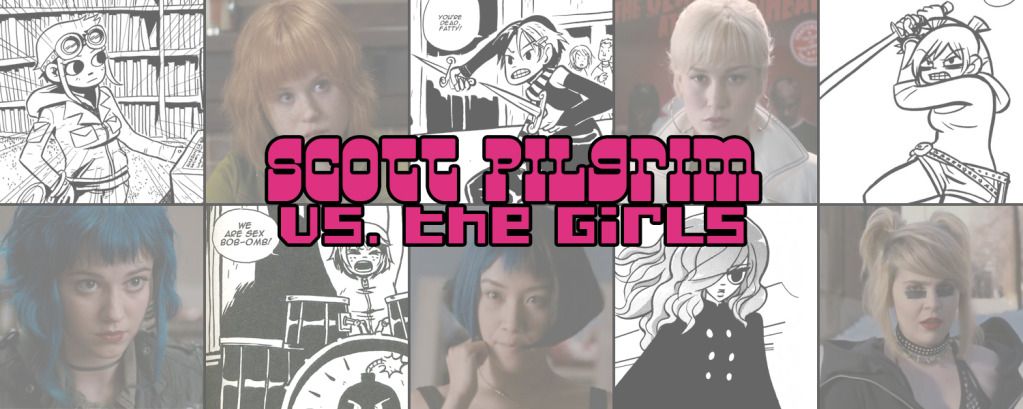
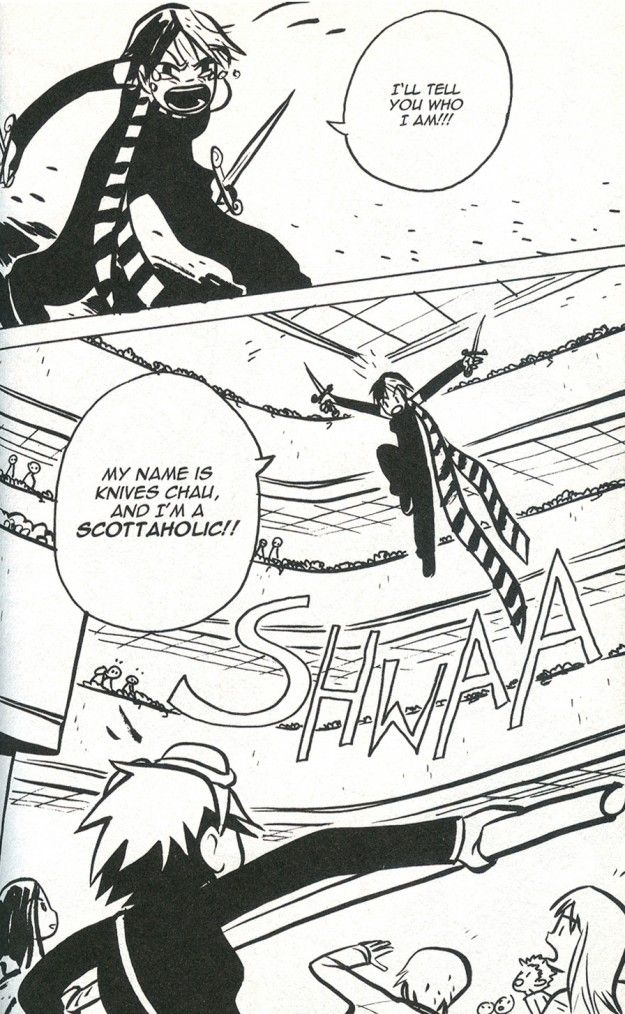
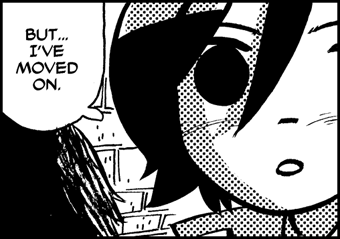
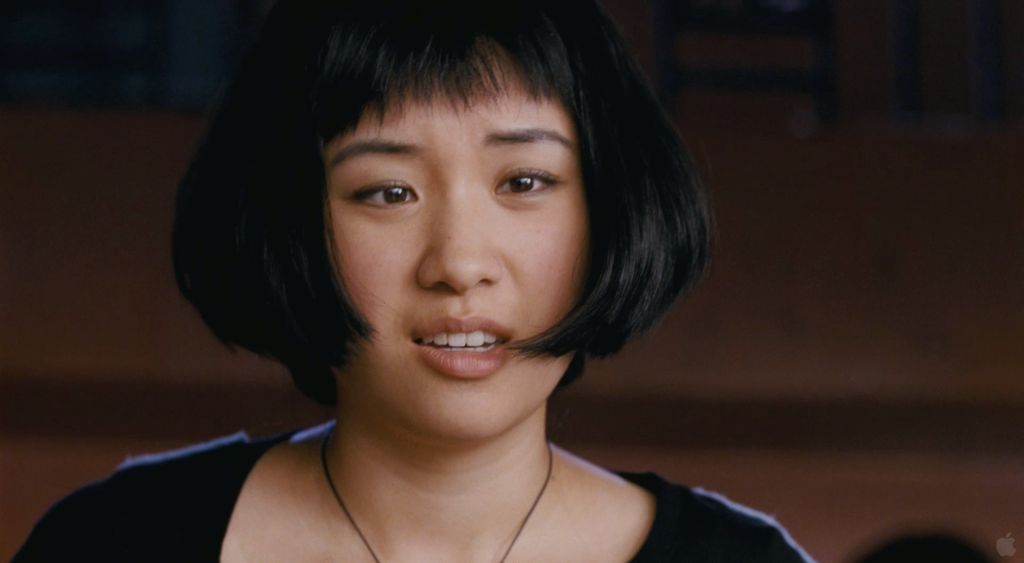
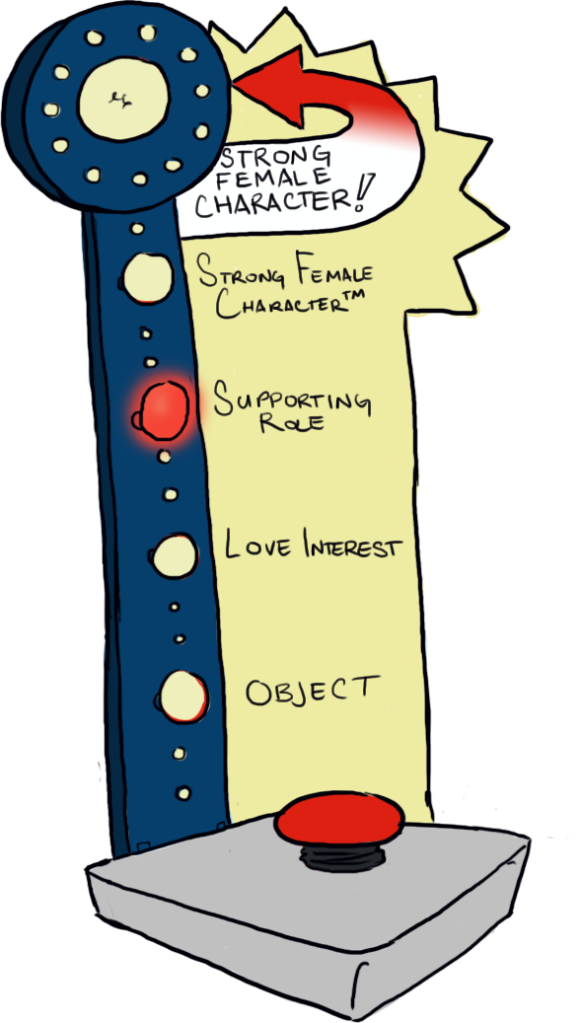
Part of the reason why she was letting Scott go at that point of the film was because:
ReplyDelete* A. the filmmakers were running out of time - they adapted five of six books AND tacked on an ending
* B. Originally Scott was supposed to end up with Knives; Ramona and Scott were supposed to come to an understanding that Knives was fighting for Scott and was the better of the two (watch the deleted scenes on YouTube) and Scott was supposed to go with Knives. But book six came out and the new ending had Scott go with Ramona
I guess the film ending had Knives learning to let go of Scott and move on in a very very short period of time, for film reasons